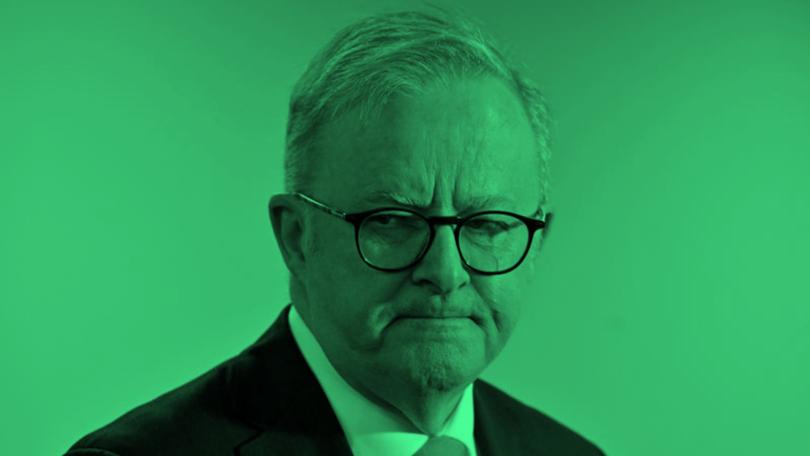Liberal Party strategist Tony Barry warns public support for renewable energy is waning
Australian support for renewables is losing altitude, a top Liberal strategist has warned.

One of the Liberal Party’s most respected strategists, Tony Barry, has warned the green energy sector that public support for renewable energy is waning and likened it to the decline in support for the Voice referendum.
Tony Barry, a former deputy state director and advisor to Malcolm Turnbull is now a director at the Melbourne-based apolitical research firm RedBridge Group.
He told the Clean Energy Council’s annual summit underway in Sydney that governments and the sector had failed to sell the green transition to voters who were increasingly sceptical of promised payoffs and were squeezed by the cost of living.
Sign up to The Nightly's newsletters.
Get the first look at the digital newspaper, curated daily stories and breaking headlines delivered to your inbox.
By continuing you agree to our Terms and Privacy Policy.He said RedBridge’s barometer measuring voters’ top concerns showed climate change was the most important issue for 30 per cent of voters three years ago, but that had collapsed to just four per cent.
In further signs that Australians were “losing confidence” in the green transition, Barry said their research showed almost two-thirds of voters believe it will add to their already high power bills, while three-quarters don’t believe we are on track to meet our carbon reduction targets.
Almost half think the switch will lead to blackouts and fewer than one in five Australians think the Government is handling the transition well.
“This is a very significant realignment of the personal issues agenda in a very short space of time,” Mr Barry said in his keynote speech.
And he warned that the assumption that climate change propelled Prime Minister Anthony Albanese into power last election and would do so again at the upcoming poll, which could be as early as this year, was misguided.
“Whilst Scott Morrison earned the right to lose the last election there were many components to that loss,” he said.
“A call for more action on climate change in inner-suburban seats was just one component, albeit an important one.
“Since then, there’s been a failure to continue prosecuting the case for renewable energy, including providing further definition around the rewards.
“In politics, if you allow a message vacuum to occur, your opponents will fill it for you. Which is exactly what is happening.”
He likened it to the failure of the Voice referendum campaign.
“There is no better recent example of this than the Voice referendum which started at around 65 per cent support and gradually lost altitude, ending at 39 per cent,” he said.
In a direct parallel to the way regional Australia largely opposed the Voice to Parliament proposal, Barry said that there was a huge split in the way inner-city voters and those in the regions viewed renewable energy.
“Those living in the regions see a system they believe is stacked against them,” he said.
“Regional voters’ grievances aren’t just with Government, there is also a pervading distrust of other institutions, like corporate Australia.”
He said Coles and Woolworths, closely followed by the banks were Australia’s biggest corporate villains in the eyes of regional voters and this was flowing onto to how they perceived the energy sector.
“So, when political and corporate leaders try to sermonise to regional Australians about the rewards of the transition to renewable energy, it’s met with deep suspicion. Government and corporates have not lived up to,” he said.
“Their promises on jobs, healthcare, cost of living, infrastructure – why would they expect energy to be any different?
But he said it was not all bad news as voters still expressed overwhelming support for renewables with a strong preference that it comes from solar or wind, although they were no longer willing to pay extra for the change.
Daniel Westerman, head of the Australian Energy Market Operator (AEMO) told the same conference that two-thirds of Australia’s current power generation comes from coal-powered fired stations, all of which are soon slated for closure.
The AEMO’s recently released roadmap says Australia’s future energy mix will be solar and wind, reinforced with storage and backed by gas for less sunny and still days.
But he said this depended on upgrading the transmission lines required to move electricity around the country.
“The biggest risk to the transmission is failing to build the social licence,” Mr Westerman said.
“At AEMO, we recognise the importance of social impact and community sentiment about the transmission Australia needs.
“It is a shared responsibility for all of us in industry and with Governments, to engage with local communities early, honestly and openly.”
But Mr Barry urged corporate Australia and the Government to ditch the glib consultant speak, saying terms like “social licence” were offputting.
“Governments and corporates are speaking to Australians in a language they don’t understand,” he said.
“Facile terms like ‘social license’ and ‘renewable energy superpower’ are big on promise but short on detail and personal relevance,” he said.
Nick Aberle from the Clean Energy Council said Mr Barry’s diagnosis hit home.
“His analysis of the problems is spot on,” Aberle told The Nightly in an interview.
“It was very well received in the room and I think it’s really important to have some of these hard truths presented.”
Aberle said while the industry was in a particular period of uncertainty, he was confident that overall support for the transition would be sustained, as communities largely embraced solar and wind farms once they were up and running.
“So I don’t see the steady and consistent decline similar to the Voice being an issue that’s facing the industry,” he said.
But he said the governments needed to lift its game to advance the cause.
“We’re really keen to see the state and federal governments play a bigger role in communicating the rationale for the energy transition,” he said.

